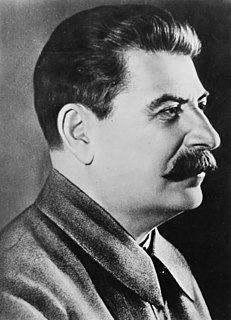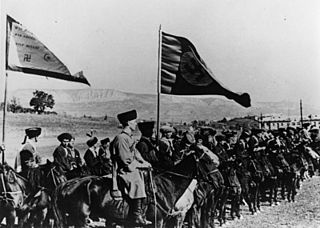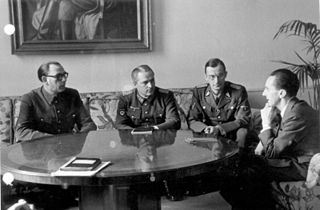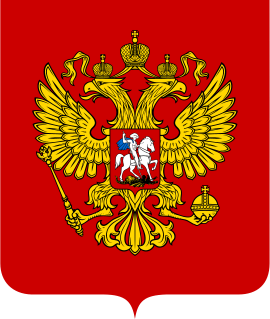Related Research Articles
Marxism–Leninism is a communist ideology which was the main communist movement throughout the 20th century. It was the formal name of the state ideology adopted by the Soviet Union, its satellite states in the Eastern Bloc, and various scientific socialist countries in the Non-Aligned Movement and Third World during the Cold War as well as the Communist International after Bolshevisation. Today, Marxism–Leninism is the ideology of several communist parties, despite the de-Leninization that occurred after the dissolution of the USSR, and remains the official ideology of the ruling parties of China, Cuba, Laos, and Vietnam as one-party socialist republics, and of Nepal in a multiparty democracy.

Operation Barbarossa was the invasion of the Soviet Union by Nazi Germany and many of its Axis allies, starting on Sunday, 22 June 1941, during World War II. The operation, code-named after Frederick Barbarossa, a 12th-century Holy Roman emperor and German king, put into action Nazi Germany's ideological goal of conquering the western Soviet Union to repopulate it with Germans. The German Generalplan Ost aimed to use some of the conquered people as forced labour for the Axis war effort while acquiring the oil reserves of the Caucasus as well as the agricultural resources of various Soviet territories. Their ultimate goal was to create more Lebensraum for Germany, and the eventual extermination of the indigenous Slavic peoples by mass deportation to Siberia, Germanisation, enslavement, and genocide.

Stalinism is the means of governing and Marxist-Leninist policies implemented in the Soviet Union from 1927 to 1953 by Joseph Stalin. It included the creation of a one-party totalitarian police state, rapid industrialization, the theory of socialism in one country, collectivization of agriculture, intensification of class conflict, a cult of personality, and subordination of the interests of foreign communist parties to those of the Communist Party of the Soviet Union, deemed by Stalinism to be the leading vanguard party of communist revolution at the time. De-Stalinization began in the 1950s and 1960s after the Krushchev thaw.

Andrey Andreyevich Vlasov was a Soviet Red Army general and Nazi collaborator. During World War II, he fought in the Battle of Moscow and later was captured attempting to lift the siege of Leningrad. After being captured, he defected to Nazi Germany and headed the Russian Liberation Army. At the war's end, he changed sides again and ordered the ROA to aid the Prague uprising against the Germans. He and the ROA then tried to escape to the Western Front, but were captured by Soviet forces. Vlasov was tortured, tried for treason and hanged.
Icebreaker: Who Started the Second World War? is a military history book by the Russian non-fiction author Viktor Suvorov, published in 1988. Suvorov argued that Joseph Stalin planned a conquest of Europe for many years, and was preparing to launch a surprise attack on Nazi Germany at the end of summer of 1941 to begin that plan. He says that Operation Barbarossa was a pre-emptive strike by Adolf Hitler, a claim which the Nazi leader himself had made at the time. Since the 1990s and the dissolution of the Soviet Union, this theory has received some support among historians in some post-Soviet and Central European states, but Western scholars have criticized his conclusions for lack of evidence and documentation.
Soviet and Communist studies is the field of historical studies of the Soviet Union and other Communist states as well as of Communist parties such as the Communist Party USA that existed or still exist in some form in many countries, inside or outside the former Soviet Bloc. Aspects of its historiography have attracted controversy between historians on topics including totalitarianism and Cold War espionage.
Throughout the history of the Soviet Union, various forms of political repression primarily existed as a means to suppress anti-communism and anti-sovietism. While these objectives were introduced after the October Revolution, many of these efforts took forms that were continuations of practices which were employed in the Russian Empire, particularly, the use of Siberian labor camps. These practices culminated during the Stalin era, when the rise of Nazi Germany was believed to pose a direct threat to state security through its incitement of counter-revolutionary elements within Russia, fears which were partially vindicated following Germany's invasion in 1941. After Stalin's death in 1953, the "Khrushchev Thaw" saw a relaxation of these practices, followed by the increased persecution of dissidents during the Brezhnev era. Under the leadership of Mikhail Gorbachev, the policies of glasnost and perestroika virtually removed all restrictions on anti-communist speech and organizing, contributing to the collapse of the Soviet state in 1991.
Wartime collaboration is cooperation with the enemy against one's country of citizenship in wartime, and in the words of historian Gerhard Hirschfeld, "is as old as war and the occupation of foreign territory".

After the United Kingdom, France, and Italy signed the Munich Agreement with Germany on 30 September 1938, an agreement which "provided 'cession to Germany of the Sudeten German territory' of Czechoslovakia, almost a year later the Soviet Union signed a non-aggression pact with Nazi Germany on 23 August 1939. In addition to stipulations of non-aggression, the treaty included a secret protocol that divided territories of Romania, Poland, Lithuania, Latvia, Estonia, and Finland into German and Soviet Union "spheres of influence", anticipating potential "territorial and political rearrangements" of these countries. In October and November 1940, German-Soviet talks about the potential of joining the Axis took place in Berlin, but nothing came from the talks since Hitler's Ideological goal was Lebensraum in the East.

The Soviet offensive plans controversy was a debate among historians in the late 20th and early 21st centuries as to whether Joseph Stalin had planned to launch an attack against Nazi Germany in the summer of 1941. The controversy started with Viktor Suvorov with his 1980s book Icebreaker:Who started the Second World War? where he argued, based on his analysis of historical documents and data, that Stalin used Nazi Germany as a proxy to attack Europe.

A large number of Soviet citizens of various ethnicities collaborated with Nazi Germany during World War II. It is estimated that the number of Soviet collaborators with the Nazi German military was around 1 Million.

The Fall of Berlin is a 1950 Soviet war and propaganda film, in two parts separated in the manner of a serial. It was produced by Mosfilm Studio and directed by Mikheil Chiaureli, with a script written by Pyotr Pavlenko and a musical score composed by Dmitri Shostakovich. Portraying the history of the Second World War with a focus on a highly positive depiction of the role Soviet dictator Joseph Stalin played in the events, it is considered one of the most important manifestations of Stalin's cult of personality, and a noted example of Soviet realism. After De-Stalinization, the film was banned in the Eastern Bloc for several decades.

Some authors have carried out comparisons of Nazism and Stalinism. They have considered the similarities and differences between the two ideologies and political systems, the relationship between the two regimes, and why both came to prominence simultaneously. During the 20th century, the comparison of Nazism and Stalinism was made on totalitarianism, ideology, and personality cult. Both regimes were seen in contrast to the liberal-democratic Western world, emphasizing the similarities between the two.
The Holocaust in the Soviet Union is the Nazi German persecution of Jews, Roma and homosexuals as part of the Holocaust in World War II. It may also refer to the Holocaust in the Baltic states, annexed by the Soviet Union before the start of Operation Barbarossa.
Authoritarian socialism, or socialism from above, is an economic and political system supporting some form of socialist economics while rejecting political liberalism. As a term, it represents a set of economic-political systems describing themselves as socialist and rejecting the liberal-democratic concepts of multi-party politics, freedom of assembly, habeas corpus and freedom of expression, either due to fear of the counter-revolution or as a means to socialist ends. Several countries, most notably the Soviet Union, China and their allies, have been described by journalists and scholars as authoritarian socialist states.

Among the approximately one million foreign volunteers and conscripts who served in the Wehrmacht during World War II were ethnic Belgians, Czechs, Dutch, Finns, Danes, French, Hungarians, Norwegians, Poles, Portuguese, Swedes, along with people from Great Britain, Estonia, Latvia, Lithuania, and the Balkans. At least 47,000 Spaniards served in the Blue Division.
The anti-Stalinist left is an umbrella term for various kinds of left-wing political movements that opposed Joseph Stalin, Stalinism and the actual system of governance Stalin implemented as leader of the Soviet Union between 1927 and 1953. This term also refers to the high ranking political figures and governmental programs that opposed Joseph Stalin and his form of communism, like Leon Trotsky and other left wing traditional Marxists.
This is a bibliographyof works on World War II.
This is a select bibliography of post World War II English language books and journal articles about Stalinism and the Stalinist era of Soviet history. Book entries have references to journal reviews about them when helpful and available. Additional bibliographies can be found in many of the book-length works listed below.

This is a select bibliography of English language books and journal articles about the Soviet Union during the Second World War, the period leading up to the war, and the immediate aftermath. For works on the Stalinism and the Soviet Union, please see Bibliography of Stalinism and the Soviet Union. Book entries may have references to reviews published in English language academic journals or major newspapers when these could be considered helpful.
References
- ↑ "Mark Edele". Mark Edele. Retrieved 1 February 2021.
- 1 2 Berkhoff, Karel C. (2018). "Stalin's Defectors: How Red Army Soldiers became Hitler's Collaborators, 1941–1945. By Mark Edele. Oxford: Oxford University Press, 2017. xvi, 205 pp. Appendix. Notes. Bibliography. Index. Figures. Tables. $80.00, hard bound". Slavic Review. 77 (4): 1107–1108. doi:10.1017/slr.2018.341. S2CID 226954661.
- ↑ Moine, Nathalie (2009). "Soviet Veterans of the Second World WarMark EDELE: , Oxford : Oxford University Press, 2008, 336 p." Cahiers du monde russe. 50 (50/2–3). doi: 10.4000/monderusse.9769 .
- ↑ Thatcher, Ian D. (2010). "Soviet Veterans of the Second World War: A Popular Movement in An Authoritarian Society 1941–1991 – By Mark Edele: REVIEWS AND SHORT NOTICES". History. 95 (317): 140–141. doi:10.1111/j.1468-229X.2009.00476_47.x.
- ↑ "Mark Edele: Soviet Veterans of the Second World War. A popular Movement in an Authoritarian Society, 1941–1991 (reviewed by Carmen Scheide)".
{{cite journal}}: Cite journal requires|journal=(help) - ↑ Behrends, Jan C. (2013). "Mark Edele. Soviet Veterans of the Second World War: A Popular Movement in an Authoritarian Society, 1941–1991. Oxford/New York, Oxford University Press, 2008, 334 p.". Annales. Histoire, Sciences Sociales. 68 (2): 612–613. doi:10.1017/S0395264900012853. S2CID 166741776.
- ↑ Smith, Mark B. (2011). "Review of Soviet Veterans of the Second World War: A Popular Movement in an Authoritarian Society, Edele, Mark". The Slavonic and East European Review. 89 (1): 174–176. doi:10.5699/slaveasteurorev2.89.1.0174. ISSN 0037-6795.
- ↑ King, Francis (2011). "Book Review: Mark Edele, Soviet Veterans of the Second World War: A Popular Movement in an Authoritarian Society 1941—1991, Oxford University Press: Oxford, 2008; x + 334 pp.; 9780199237562, £58.00 (hbk)". European History Quarterly. 41 (3): 521–522. doi:10.1177/02656914110410030413. S2CID 144811242.
- ↑ Main, Steven J. (2012). "Stalinist Society 1928–1953". Europe-Asia Studies. 64 (6): 1143–1144. doi:10.1080/09668136.2012.691384. S2CID 153384901.
- ↑ Waterlow, Jonathan (2012). "Stalinist Society, 1928–1953 - By Mark Edele: REVIEWS AND SHORT NOTICES". History. 97 (327): 525–528. doi:10.1111/j.1468-229X.2012.00561_31.x.
- ↑ Brandenberger, D. (2012). "Stalinist Society, 1928–1953, by Mark Edele". The English Historical Review. 127 (529): 1585–1587. doi:10.1093/ehr/ces264.
- ↑ Hoffmann, David L. (2012). "Stalinist Society, 1928–1953. By Mark Edele. Oxford Histories. Oxford: Oxford University Press, 2011. x, 367 pp. Notes. Bibliography. Index. Figures. Tables. $99.00, hard bound. $35.00, paper". Slavic Review. 71 (4): 946–947. doi:10.5612/slavicreview.71.4.0946. S2CID 164921879.
- ↑ Langerbein, Helmut (2019). "Stalin's Defectors: How Red Army Soldiers became Hitler's Collaborators, 1941–45Mark Edele". Holocaust and Genocide Studies. 33 (1): 130–132. doi:10.1093/hgs/dcz015.
- ↑ "Stalin's Defectors by Mark Edele – from Red Army soldiers to Hitler's collaborators". the Guardian. 13 October 2017. Retrieved 1 February 2021.
- ↑ Dale, R. (2018). "Review of Stalin's Defectors: How Red Army Soldiers became Hitler's Collaborators, 1941–1945, Edele, Mark". The Slavonic and East European Review. 96 (4): 793–795. doi:10.5699/slaveasteurorev2.96.4.0793. ISSN 0037-6795.
- ↑ Slepyan, Kenneth (2020). "Stalin's Defectors: How Red Army Soldiers Became Hitler's Collaborators, 1941–1945 . By Mark Edele.Oxford: Oxford University Press, 2017. Pp. xiv+206. $81.00. Soviet Russians under Nazi Occupation: Fragile Loyalties in World War II . By Johannes Due Enstad. New Studies in European History. Edited by Peter Baldwin et al.Cambridge: Cambridge University Press, 2018. Pp. xviii+256. $99.00". The Journal of Modern History. 92 (2): 479–482. doi:10.1086/708598.
- ↑ Reese, Roger R. (2018). "Mark Edele. Stalin's Defectors: How Red Army Soldiers Became Hitler's Collaborators, 1941–1945". The American Historical Review. 123 (4): 1429–1430. doi:10.1093/ahr/rhy170.